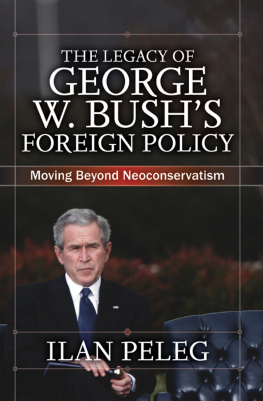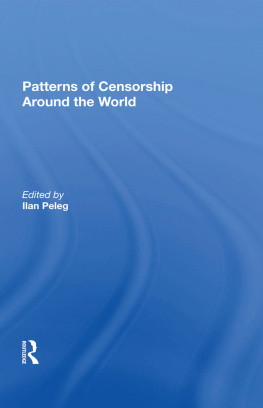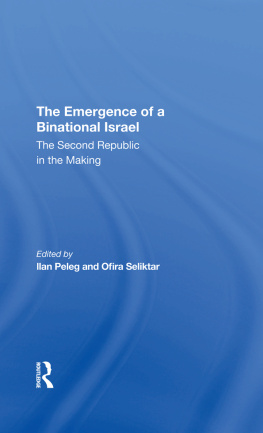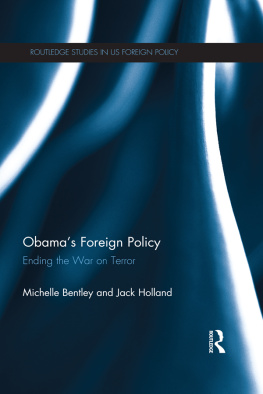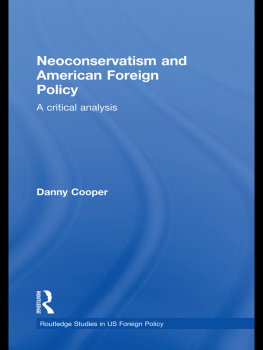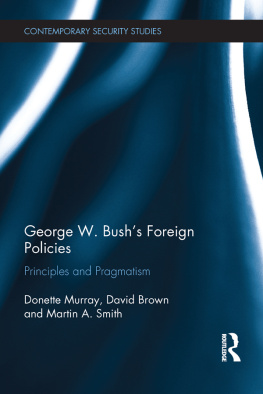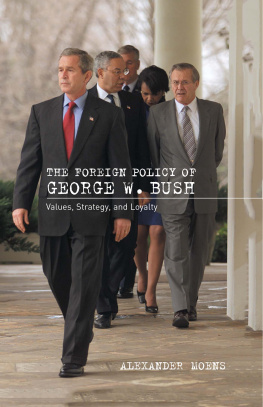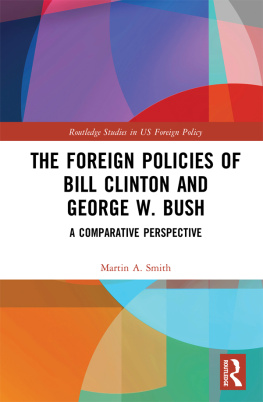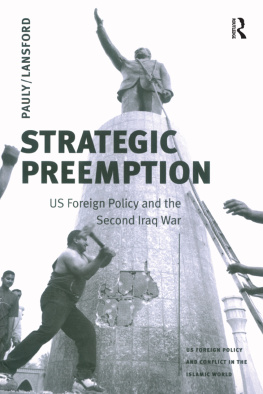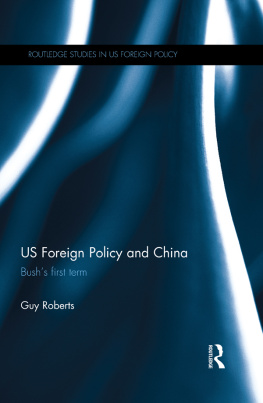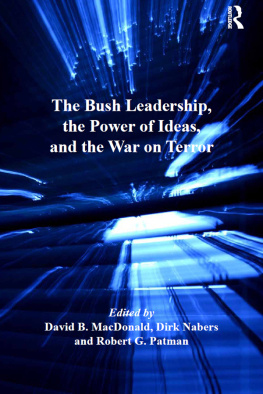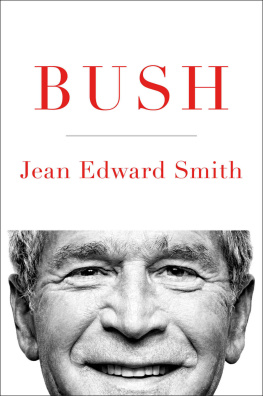First published 2009 by Westview Press
Published 2018 by Routledge
711 Third Avenue, New York, NY 10017, USA
2 Park Square, Milton Park, Abingdon, Oxon OX14 4RN
Routledge is an imprint of the Taylor & Francis Group, an informa business
Copyright 2009 Taylor & Francis
All rights reserved. No part of this book may be reprinted or reproduced or utilised in any form or by any electronic, mechanical, or other means, now known or hereafter invented, including photocopying and recording, or in any information storage or retrieval system, without permission in writing from the publishers.
Notice:
Product or corporate names may be trademarks or registered trademarks, and are used only for identification and explanation without intent to infringe.
Every effort has been made to secure required permissions to use all images, maps, and other art included in this volume.
Designed by Timm Bryson
Library of Congress Cataloging-in-Publication Data
Peleg, Ilan
The legacy of George W. Bushs foreign policy : moving beyond neoconservatism / Ilan Peleg.
p. cm.
Includes bibliographical references and index.
ISBN 978-0-8133-4446-1 (alk. paper)
1. United StatesForeign relations20012. Bush, George W. (George Walker), 1946 I. Title.
JZ1480.P45 2009
327.73dc22
2008045541
ISBN 13: 978-0-8133-4446-1 (pbk)
The last pages of this volume are being written as the administration of George W. Bush is coming to an end and Barack Obama is preparing to take office as the forty-fourth president of the United States. The worldwide reaction to the election of Senator Obama on November 4, 2008, was more enthusiastic than the reaction to the election of any other president in American history. To a very large extent this enthusiasm could be explained as the response of the world to Bushs foreign policy and as reflecting the widespread expectations that Obama will chart a substantially new international course for America and, indeed, for the world. In watching Obamas ascendance to the most powerful position in the world, we have witnessed a seismological change, a Richter scale event of 9.5 (or more) with potentially enormous consequences.
The foreign policy of George W. Bush, the forty-third president of the United States, was greatly impacted by the prolific writings on foreign policy by the group of American intellectuals that has become known as Neoconservatives. While the debate on exactly who is a Neoconservative and what precisely Neoconservatism stands for might continue for years to come, the general contours or tenets of the Neoconservative philosophy, persuasion, or movement are sufficiently clear to have it as a subject of analysis. The Neoconservatives have promoted for several decades a muscular, unilateralist, militaristic, and hegemonic American foreign policy. The foreign policy of the Bush administration followed, in many if not in all respects, this Neoconservative prescription.
If foreign policy prescription can be judged by its results, Neoconservatism, as the ideational basis for the foreign policy of George W. Bush, ought to be regarded as a huge failure, an unmitigated disaster of historic proportions (see ). Not only did Bushs foreign policy not relieve the dangers associated with international terrorism, it aggravated them, making them more acute. Not only did this foreign policy not result in strengthening Americas standing in the world, it diminished it significantly. The countrys prestige, status, and legitimacy have never been lower than at the end of the Bush administration.
If Bushs years in the White House are not to be construed as a complete waste, they should serve as a historical laboratory, a testing ground for ideas that might produce a better and brighter future for America and the world. Those eight years ought to be examined empirically, and from as many perspectives as possible; then we should draw lessons for the future by better understanding the Bush years. This book does both.
While this volume focuses on the Bush years, 2001 through 2008, it is intensely interested in one fundamental, future-oriented questionwhat international role ought the United States play in the post-Bush era? Although some observers might believe that Americas days as a world leader are numbered, of this book reflects a different perspective. By the sheer size of its economic and military power, the creative inventiveness and ingenuity of its people, the diversity of its population, and the openness of its culture (however constrained by prominent social forces within it), the United States is destined to be among the top world leaders and, in all probability, the single most prominent global leader in decades to come. However, to maintain its leadership position, to transfer it from the twentieth to the twenty-first century, America must not only leave the Bush legacy behind but also reinvent itself. It ought to be, and project itself as being, a thoughtful, deliberative, well-informed, moderate force on the world stage, not a unilateralist, militaristic, and nationalistic bully. In brief, the attitudinal prism described in this volume as Neoconservatismpresent in and out of the Bush administrationought to be relegated to the ash heap of history if the United States is to recover its traditional role as consensus-developer, institution-builder, and rights-promoter.
To move beyond Neoconservatism, we need to understand the essence and the core values of that persuasion, particularly as it was implemented by the Bush administration (see ). In many ways Neoconservatism presented to the world the ultimate unattractive model of US foreign policy, a combination of an exceptionalist America, militaristic and unilateralist in its modus operandi, imposing its will while dangling its values and promoting its narrow national interests (as perceived by the Bush administration) while presuming to represent universal ideals of democracy and freedom. No wonder that the policy inspired by Neoconservative ideas was met with rejection, resentment, opposition, and eventually active resistance, and that the push back was stronger and more profound than ever. The foreign and security policy based on Neocon ideology simply lacked the wisdom and the balance of Realist nuance. While the toppling of Afghanistans Taliban regime was considered a reasonable act of self-defense on the part of America, when the Bush administration and the Neocons turned to the liberation of Iraq and the democratization of the Middle East they lost almost all international support. The well-deserved worldwide sympathy toward America of the post-9/11 era withered away. The genuine goodwill of the world toward the United States was squandered.
This volume argues that Neoconservatism, despite its name, is one of the most revolutionary, nonconservative movements in the history of American foreign policy. While Neoconservatives have often appeared to the world as tough-minded realists, in fact they have been prisoners of their own ideological, revolutionary illusions and delusions. Accepting uncritically Francis Fukuyamas triumphal idea (or at least the way it was interpreted by many) that Western democracy has won and that it is bound to spread all over the world, the Neocons and their allies in the Bush administration were resolutely intent on imposing their democratic dream abroad. The Iraq war was conceived as an exercise in spreading democracy, a litmus test for benevolent hegemony, a dress rehearsal for bigger and better things. It turned out to be a model of overoptimistic, shortsighted zealotry, accompanied by a set of rosy predictions on the flourishing of democracy in the authoritarian Middle East. Americas dream of benevolent hegemony turned into Americas nightmare of endless war accompanied by the loss of legitimacy in the eyes of most of the worlds citizens.

